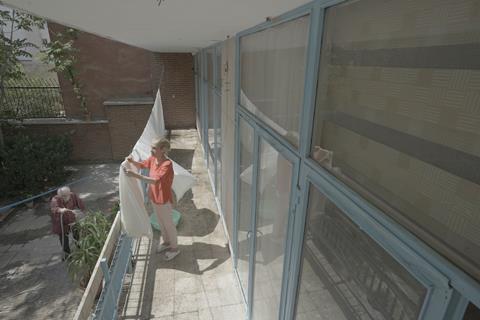Directors Firouzeh Khosrovani and Morteza Ahmadvand explore the link between a US-based woman and her parents in Tehran

Dirs: Firouzeh Khosrovani, Morteza Ahmadvand. Iran/Norway/Italy. 2025. 72mins
How does it feel to leave family behind in a place to which you can never return? And does the modern gift of 24-hour screen access to those distant loved ones soothe the heartache, or make it worse? These are just two of the more easily accessible questions explored in this poignant, thoughtful documentary by US-based Iranian director Firouzeh Khosrovani and her Tehran-based colleague Morteza Ahmadvand.
Beautifully shot with a real emotional charge
The fact that Past Future Continuous gradually reveals itself to be, to some extent, a fictionalized construct may trouble some viewers, but it is far from being a metacinematic game. Instead, the gradual erosion of its first-person confessional surface feels like an opening up towards the recognition that the trauma outlined here is shared – a part, perhaps, of the Iranian condition.
After premiering in Venice Days, Past Future Continuous has most recently won best film in IDFA’s Envision competition. It’s a work that pushes formal boundaries, but this four-hander is also beautifully shot with a real emotional charge – one underlined by Christophe Rezai’s wistful keyboard, violin and viola soundtrack. After a long festival run, it seems well-placed to tempt specialized theatrical programmers and screening platforms.
A long fixed shot of a modern city seen though a broken window opens the film. The snowy mountains in the distance seem painted while, in the foreground, rain falls incessantly. We hear two voices in succession: the woman’s warmer and more confiding, the man’s solemn, even declamatory, as if he is reading poetry. These two voices will be our only guides, and working out how they relate to each other will be one of several challenges for the audience.
Maryam, the woman, tells us that she has had security cameras installed in her aging parents’ house in Tehran, and footage from these eight cameras – beginning with a view of the top of the technician’s head as he adjusts the one in the living room – forms the backbone of Past Present Continuous. Her father was an architect, and designed this low modernist house that seems shoehorned into a vacant lot, dwarfed by its neighbours. Now, he’s the frailer of the two parents, shuffling around with a walking frame, while his wife cooks and changes lightbulbs.
We slowly work out that Maryam has a teaching position somewhere in the US, and that she is considered persona non grata by the Iranian regime. Before the cameras were installed, she phoned her parents maybe once a week; now she finds herself following them obsessively through the day, cooking the same dishes she sees her mum making, calling constantly.
Home movies from Maryam’s early childhood show her parents to have been 1960s trendsters, part of the country’s liberal intelligentsia. Archive material affords us glimpses of the Iranian Revolution of 1978 and the Iran-Iraq War that began two years later – a war that claimed the life of a male playmate of Maryam’s that we see in those family Super 8s. There are dreamlike inset sequences – one of them, a repeated image of a fluttering white bird – being one of this poised and self-aware film’s few misfires, with its cliched wedding-video feel.
The security camera footage itself is not quite what we expect either: it seems hyper-real, dazzlingly sharp and, while we hear no conversation – either from the parents or the parrot Maryam sends them when she can bear their loneliness no longer – the dropping of a glass or the fall of a sheet from a laundry line are eerily amplified.
Khosrovani’s previous solo project, 202’s Radiograph of a Family (on which Ahmadvand served as art director) shared a preoccupation with the unreachability of a childhood home, but there we accepted that the family she was using to illustrate the fractures in Iranian society was her own. Here, in a film whose final credits list three scriptwriters, two voice-over narrators and two ‘reenactment’ cast members, we know that something a little more complicated is going on.
Production companies: FiFi Film, Antipode Films, ZaLab
International sales: Taskovski Films, irena@taskovskifilms.com
Producer: Firouzeh Khosrovani
Screenplay: Firouzeh Khosrovani, Morteza Ahmadvand, Naghmeh Samini
Cinematography: Mohammad Hadidi
Editing: Solmaz Eftekhari
Music: Christophe Rezai















![[L-R]: Amanda Villavieja, Laia Casanovas, Yasmina Praderas](https://d1nslcd7m2225b.cloudfront.net/Pictures/274x183/6/4/1/1471641_pxl_20251224_103354743_618426_crop.jpg)








